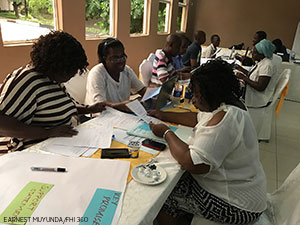 FANTA hosted two workshops in February to support nutrition advocacy efforts in Zambia. Building on existing advocacy efforts, and to create an enabling environment for nutrition, FANTA worked closely with the Zambia Ministry of Health (MOH) and the National Food and Nutrition Commission (NFNC) to facilitate a one-day stakeholder meeting and two workshops.
FANTA hosted two workshops in February to support nutrition advocacy efforts in Zambia. Building on existing advocacy efforts, and to create an enabling environment for nutrition, FANTA worked closely with the Zambia Ministry of Health (MOH) and the National Food and Nutrition Commission (NFNC) to facilitate a one-day stakeholder meeting and two workshops.
Zambia PROFILES Workshop 2017
The first workshop was the Zambia PROFILES Workshop 2017, which occurred on February 14–17. Participants developed evidence-based estimates using country-specific data and a spreadsheet tool (PROFILES), to calculate the negative consequences if there is no improvement to the country’s nutrition problems, and the benefits of improved nutrition on development outcomes such as lives saved, human capital, and economic productivity gains.
Nutrition Advocacy Planning Workshop
 The second workshop was the Nutrition Advocacy Planning Workshop, which was held February 27–March 2. Working collaboratively, participants developed a strategic, multi-sectoral national nutrition advocacy plan. Activities outlined in the plan, which build on existing nutrition advocacy efforts, will build a critical mass of nutrition advocates and promote a national coordinated effort on nutrition. During the workshop, participants established advocacy objectives and identified the steps needed to achieve those objectives. The process included segmenting target audiences (e.g., media, policymakers, politicians, civil society, etc.) and tailoring materials and activities to each audience, based on desired changes and perceived barriers among each audience. Participants also completed planning tools for prioritized nutrition advocacy materials to support the nutrition advocacy plan.
The second workshop was the Nutrition Advocacy Planning Workshop, which was held February 27–March 2. Working collaboratively, participants developed a strategic, multi-sectoral national nutrition advocacy plan. Activities outlined in the plan, which build on existing nutrition advocacy efforts, will build a critical mass of nutrition advocates and promote a national coordinated effort on nutrition. During the workshop, participants established advocacy objectives and identified the steps needed to achieve those objectives. The process included segmenting target audiences (e.g., media, policymakers, politicians, civil society, etc.) and tailoring materials and activities to each audience, based on desired changes and perceived barriers among each audience. Participants also completed planning tools for prioritized nutrition advocacy materials to support the nutrition advocacy plan.
In attendance at each workshop were 20–25 representatives from government sectors including health, agriculture, fisheries and livestock, education, local government and housing, and water and sanitation. In addition, representatives from UN agencies, USAID implementing partners, academia, civil society, and the media attended the workshops.


